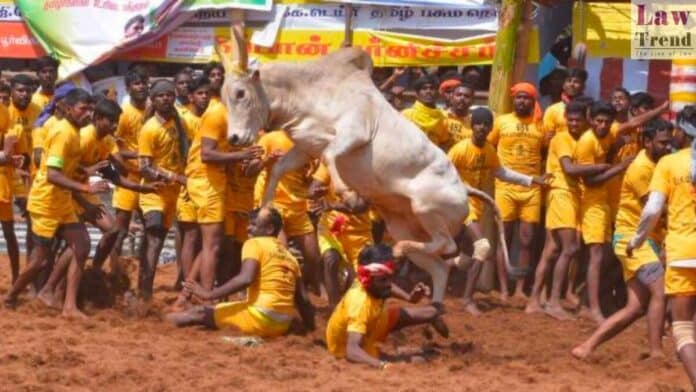The People for the Ethical Treatment of Animals (PETA) has moved the Supreme Court seeking review of its May 18 verdict upholding the validity of the amended laws of Tamil Nadu, Maharashtra and Karnataka which allowed bull-taming sport ‘Jallikattu’, bullock-cart races and buffalo racing sport ‘Kambala’.
In its review plea, PETA has said the judgement suffers from errors apparent on the face of the record and warrants the exercise of review jurisdiction by the apex court.
In a unanimous verdict, a five-judge constitution bench headed by Justice K M Joseph (now retired) had noted The Prevention of Cruelty to Animals (Tamil Nadu Amendment) Act, 2017, The Prevention of Cruelty to Animals (Maharashtra Amendment) Act, 2017 and The Prevention of Cruelty to Animals (Karnataka Second Amendment) Act, 2017 were enacted by the respective state legislatures and had received presidential assent.

‘Jallikattu’, also known ‘eruthazhuvuthal’, is a sport played in Tamil Nadu as part of the Pongal harvest festival.
The ‘Kambala’ race, held in Karnataka between November and March, involves a pair of buffaloes tied to a plough and anchored by one person. They are made to run in parallel muddy tracks in a competition in which the fastest team wins.
In its verdict, the apex court had said ‘Jallikattu’ is a type of bovine sports and “we are satisfied on the basis of materials disclosed before us, that it is going on in the state of Tamil Nadu for at least last few centuries”.
“Our decision on the Tamil Nadu Amendment Act would also guide the Maharashtra and the Karnataka Amendment acts and we find all the three Amendment Acts to be valid legislations,” the bench, also comprising justices Ajay Rastogi (now retired), Aniruddha Bose, Hrishikesh Roy and C T Ravikumar, had said in a 56-page judgement.
In its plea seeking review of the verdict, PETA has said these ‘sports’ are against the natural instinct, behaviour and anatomy of the bulls, bullocks and buffaloes, serve no essential purpose, and “cause untold suffering, pain and cruelty to the animals used in them”.
It said detailed documents were placed on record by the petitioner in the form of elaborate on-ground eyewitness investigation reports between 2017 and 2022 for various locations where ‘Jallikattu’, ‘Kambala’ and bullock cart races were conducted.
“The judgement fails to consider any part of the detailed factual and scientific record which was produced before this court that shows that ‘Jallikattu’ and buffalo and bullock-cart racing events are inherently cruel and in fact, continue to be marked by immense cruelty even after the passage of the impugned amendments,” the plea said.
It claimed the apex court has “committed a grave error of law” by justifying the impugned amendments, which are legislative acts, on the sole basis of subordinate rules or notifications framed under these enactments by the government.
“The Constitution is a progressive charter of rights, which leads to, as its corollary, the doctrine of non-retrogression. The judgement disregards this fundamental constitutional principle by undoing the expansive and beneficial interpretation of Article 21 and Article 51-A(g) that was laid down in A Nagaraja and other decisions of this court and the high courts,” the petition said.
Also Read
It said the decision arrived at in the verdict gives rise to a “serious miscarriage of justice”.
In its judgement, the apex court had referred to its 2014 verdict, which had said bulls cannot be used as performing animals either for ‘Jallikattu’ events or bullock cart races and banned their use for these purposes across the country.
The bench, which dealt with the five questions referred to it by a two-judge bench of the apex court in February 2018, had said whether ‘Jallikattu’ has become integral part of Tamil culture or not requires religious, cultural and social analysis in greater detail, “which in our opinion, is an exercise that cannot be undertaken by the judiciary”.
Holding that the Tamil Nadu Amendment Act is not a “piece of colourable legislation”, the bench had said it relates, in pith and substance, to Entry 17 of List III of Seventh Schedule to the Constitution.







